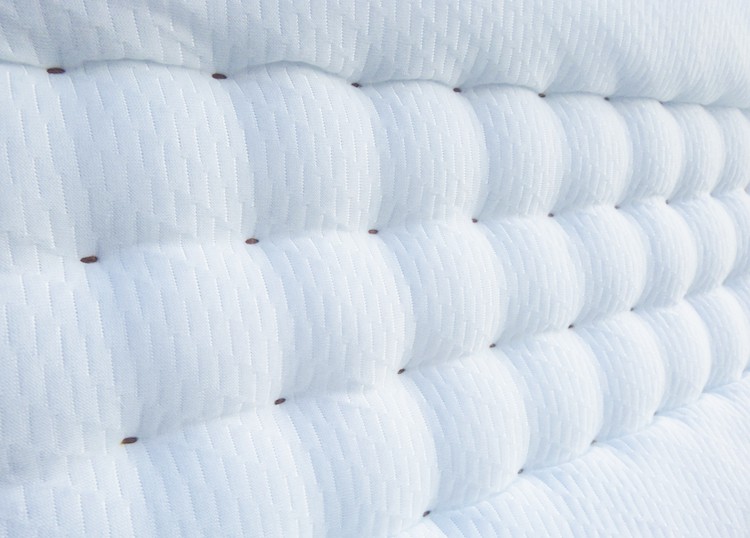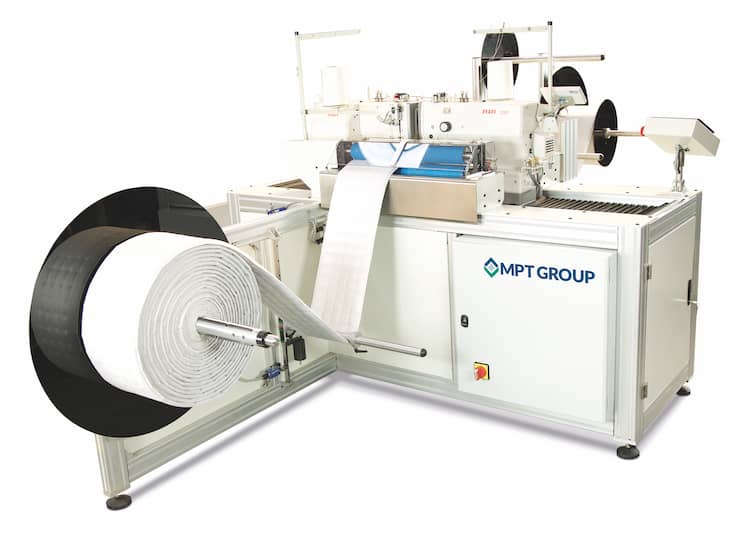Machinery supplier is rolling out new equipment to reduce labor, improve productivity; plans U.S. office
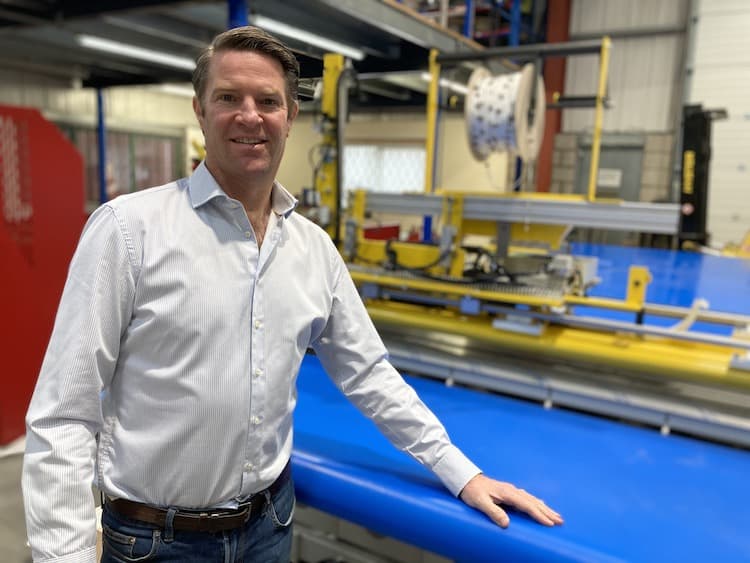
MPT Group hasn’t let the challenges of a global pandemic get in the way of its plans for continued growth. During the past five years, the maker of mattress machinery has seen demand steadily grow for its products in the United States and neighboring markets of Mexico, Central America and South America, and that trend accelerated in 2020. As a result, MPT Group will soon open its first dedicated field office in the United States to service the region, says Andrew Trickett, managing director of the Bacup, England-based company.
“We now have more than 150 different machines operating in the U.S. and Mexican markets, including the Infinity Sleep Support System, Autotufter and other machines from our sewing automation lines,” Trickett says. “To support this activity and growth, it’s important for us to make the investment to provide an on-the-ground service response.”
AT A GLANCE
Company
MPT Group
Headquarters
Bacup, England, where it operates a 25,000-square-foot facility
Specialty
Machinery supplier for the mattress industry. Line includes a wide range of mattress making machinery, including machines for tufting, quilting, tape-edge, serging, flanging and label sewing, as well as machines for making continuous-wire spring coil units.
History
Founded in 1986 by David Trickett and Paul Rodgers as Dimegrove Engineering, a reseller of used mattress machinery. Began making new machinery in 1989. Company reincorporated as MPT Group in 1999.
Ownership
Privately held by Managing Director Andrew Trickett and co-founders David Trickett (now retired) and Paul Rodgers, head of MatParts.co.uk.
Learn more
As customers across the globe gain more experience with MPT Group’s equipment and the quality of its after-sales service support, they gain confidence in making additional investments in the company’s machines, Trickett adds.
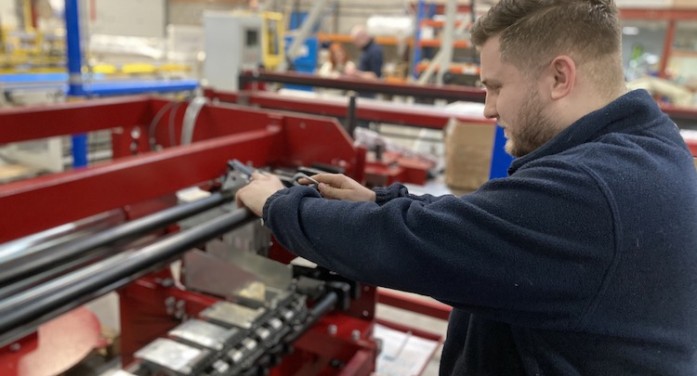
The Covid-19 pandemic has proven to be a busy sales period for MPT Group — as it has for much of the industry — as homebound consumers have upgraded their home furnishings, including new beds. “Just like in the U.S., there’s been a big uptick in the U.K. on spending on sleep, and that’s led to new investments in mattress machinery,” Trickett says.
Business during the pandemic “has been remarkable but not without its challenges,” such as limits on travel, he says. Such restrictions have led to new ways of doing business, such as video conferencing, “which have enlightened our approach to working with clients as we move forward,” Trickett says.
MPT Group entered 2021 with $5.6 million in sales on its books — more than double its typical orders, Trickett says. Orders have come from a variety of locations around the globe, and Trickett expects strong demand to continue into 2022, thanks to new initiatives it has planned.
Infinity — and beyond
As MPT Group seeks to broaden its reach in the United States, it also is expanding its presence in other markets. The company does business in 96 countries, from Asia, Africa and the Americas to countries throughout Europe and virtually every other part of the globe.
“Seventy percent of the machines that we make are exported,” Trickett says, adding that MPT Group has more than 100 Infinity Sleep Support Systems in operation worldwide. That is up from about 30 systems five years ago.
The Infinity machinery for spring production, which features patented technology, has been particularly popular due to its combination of high productivity and low operating and labor costs, Trickett says. (See ad on page 4.) The machinery also enables producers to create lightweight plush mattresses. A typical 7 ¾-inch, queen-size Infinity spring unit with 640 coils weighs just over 24 pounds.
“The Infinity system sets a new standard for premium open-coil spring unit production,” Trickett says. “Our unique microgauge technology produces a continuous spring unit with excellent durability and body conformity properties.”
The system cuts unit manufacturing costs by as much as 32% for producers of open-coil units — or as much as 60% for bedding manufacturers that are purchasing spring units from outside sources, he says. This data is based on feedback from customers about actual results they’ve achieved, he adds.
Another key selling point of Infinity, Trickett says, is the new Ultra High Loft System, which enables spring unit producers to create units with coils as tall as 7 ¾ inches and a total of more than 800 coils. This enables manufacturers to offer mattresses with higher profiles and increased coil counts, avoids the need to add costly fillings to achieve unit height and “gives even further justification to potential buyers to consider the system,” he says.
Customers come first
Creative, customer-focused product development has been a hallmark of MPT Group. The company traces its roots to 1986, when Andrew Trickett’s father, David Trickett, a fiber salesman, ventured into selling secondhand machinery. The elder Trickett soon teamed up with Paul Rodgers, a successful sewing machine repair specialist and “visionary product development engineer,” Andrew Trickett says.
Seeing an opportunity to serve the bedding market with new equipment, the elder Trickett and Rodgers founded Dimegrove Engineering in 1989 and began designing and building bedding machinery. Over time, the business reincorporated as MPT Group. (MPT is short for Mattress Production Technology.)
In the early to mid-1990s, MPT Group introduced two machines that established a solid foundation for steady growth. The first was Matramax, a high-speed tape-edge machine introduced in 1993. The second was BordaTac, which simulates the types of sophisticated, hand-stitched mattress borders associated with high-end British mattresses, Trickett says.
A four-tack border produced by the BordaTac S2 (right), the latest version of MPT Group’s simulated side-stitching machines that offers several tack configurations.
Since its introduction, more than 1,800 Matramax tape-edge machines have been placed in operation worldwide. “And BordaTac has become a must-have machine for any company looking to produce mattresses with a quintessential British influence,” Trickett says. Another longtime staple of the company, he adds, is the Autotufter, a fully automatic mattress- and futon-tufting machine.
Within 10 years of its launch, MPT Group also grew by acquiring two other British producers of bedding machinery — P. Fanghanel & Co. Ltd. and Matramatic Co. Ltd. The acquisitions broadened the range of machines in MPT Group’s line and also brought in new capabilities in terms of product development and engineering expertise.
Today, MPT Group sells nearly 40 different machines for mattress production. The company’s product range includes machinery for wire forming, border and mattress quilting, tufting, tape-edging, serging, flanging and label sewing, as well as machines for material processing and spring unit roll packing. MPT Group also supplies machines for sewing composite materials used to produce the world’s largest wind turbine blades.
“Our focus is always on innovation,” Trickett says. “With every machine we develop, we try to come up with something that’s a little bit new and unique to give our customers an edge in the marketplace.”
MPT Group’s customers include a wide range of bed makers, from small startups to large, well-established international companies and licensing groups, such as Restonic, Spring Air International and Therapedic International. “We can tailor a solution to any plant size or budget that meets their needs, whether that involves cutting costs, expanding their design capabilities or improving productivity,” Trickett says.
Increasing efficiencies
In the tufting arena, MPT Group’s flagship machine is the Autotufter. Updated in 2020 with a newly patented, multiple lace length system, the Autotufter now can automatically select and load the required lace lengths, tuft configuration and tufting pattern for any mattress in an assembly line without operator intervention. It is suitable for both mattresses and futons, including high-profile beds.
The Autotufter can tuft more than 200 mattresses in a typical eight-hour shift, doubling the capacity of manual tufting operations, while also reducing both production bottlenecks and staffing needs, Trickett says. With a dozen machines in operation in the United States, the system is “clearly striking a chord with clients,” Trickett says. “This latest innovation eliminates downtime for lace changes, resulting in less material handling, faster cycle times and higher productivity.”
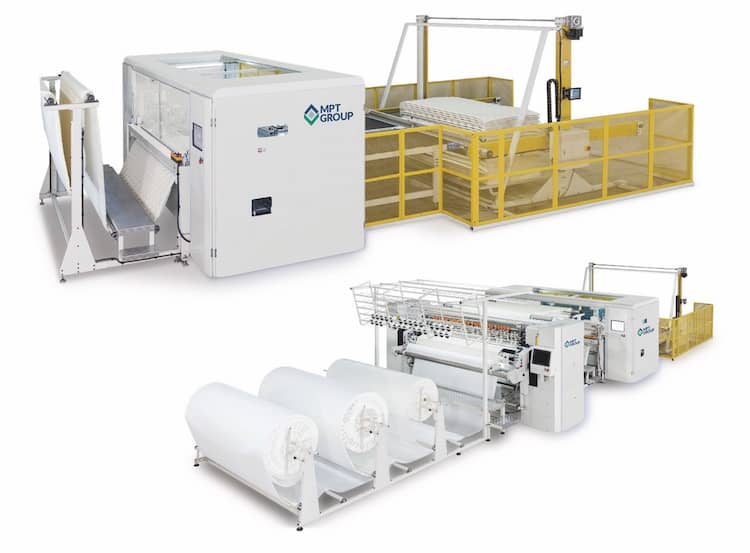
Also helping bed makers improve productivity is Smart-Hem, a fully automatic hemming station for microquilted panels. The Smart-Hem has been designed so it can be paired with any manufacturer’s multineedle quilting machine and avoids the need for flanging of the mattress panel after quilting.
“This is a huge labor-saving solution and introduces a single-process alternative to current quilting methods, further reducing labor requirements when producing quilted panels,” Trickett says.
In the multineedle quilting arena, MPT Group recently introduced the iQuilt2 machine. Following the success of its first multineedle machine brought to market in 2009, iQuilt2 is a chain-stitch quilter with full tack-and-jump capability and a speed of 1,200 rpm. iQuilt2 can be integrated with an optional, fully automated panel cutter for multislit borders or with the Smart-Hem for the production of finished panels.
The Windows-based system comes with more than 180 preinstalled designs, but with its integrated CAD capabilities, design options are limitless, Trickett says. “iQuilt2 is incredibly competitive with a price of $125,000 delivered to any site in the U.S.,” he says. “It provides an unmatched quilting solution that has captured the attention of numerous companies worldwide.”
With all of its machines, MPT Group is on the lookout for new ways to help its customers improve both productivity and quality. To that end, one area of focus is product traceability.
“We use ‘active systems’ with RF-chip technology that allow the manufacturer to trace a bed as it moves through every step of the manufacturing process,” Trickett says. “That data provides new insights on bottlenecks in production, helping to identify processes that need to be adjusted.”
The radio frequency-chip technology also allows products to be tracked from the warehouse through delivery to the retailer and final consumer. “That data can help with the loading of vehicles and also help determine which method of shipping is the fastest and most cost-efficient,” Trickett says. And if a product is returned, the chip provides valuable information about when the bed was produced and who worked on it.
Thinking globally, building locally
Since its founding, MPT Group has produced its machines at a facility in the Lancashire district of northwestern England. The 25,000-square-foot facility also houses the company’s corporate offices. The company is vertically integrated and includes a research-and-development team, as well as production, service and installation engineers. Most of the 35-person staff has been with the company for more than 10 years, a fact in which Trickett takes great pride. “They are the core of our company’s DNA and success,” he says.
“In 2020, we initiated a new program of cross-training so each member of our workforce can work on any one of our machines,” Trickett says. This approach enables the company to respond more quickly to a surge in demand for its products, he adds, because team members are able to move outside their areas of specialty when needed.
To improve efficiencies in the face of rising demand, MPT Group also has begun outsourcing some components. “We’ve increased productivity by 30% by bringing in parts from trusted suppliers,” Trickett says.
MPT Group prides itself on the quality of its machines and its high rate of customer satisfaction. “If someone buys a machine from us, they tend to be a customer for life,” Trickett says. “Over time, the sale of one machine leads to the sale of many other pieces of equipment.”
He attributes this success to the “reliability of our machinery, as well as the responsive and effective after-sales support we provide.”
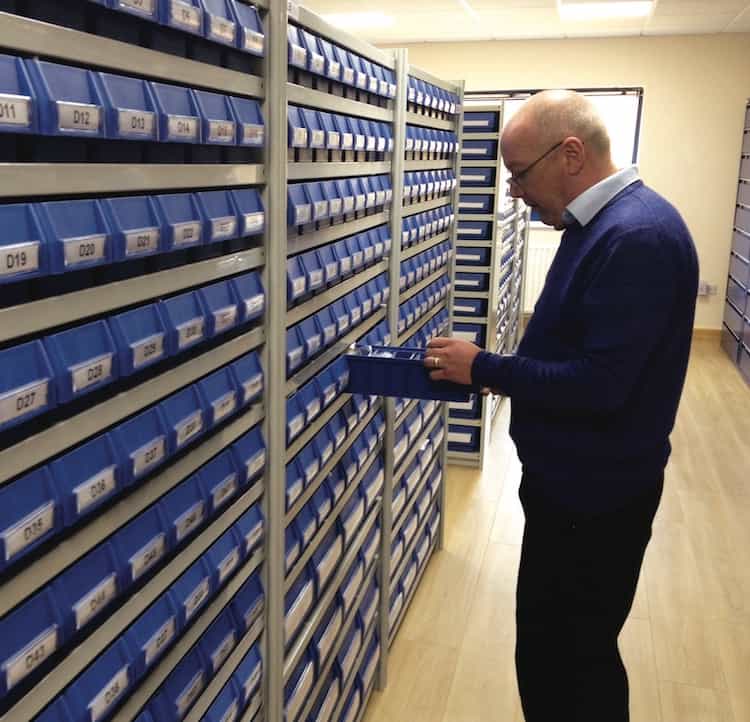
MPT Group’s team of service and technical engineers provides on-site support, as well as remote diagnostic and video conference support to customers. In addition, the company contracts with Siemens and Schneider Electric to provide field support for its machines in markets throughout the world, including the United States. New machines are set up on-site in plants by MPT Group engineers. Every machine sold by MPT Group comes with a two-year warranty.
“During normal (pre-pandemic) times, one of our engineers is in the U.S., Mexico or Europe nearly every month to support new machines being delivered,” Trickett says. “We use this opportunity so that if another customer in the region has an issue, the engineer will make a point to visit that location.”
To support its product line, MPT Group services clients needing spare parts through MatParts.co.uk. The business, owned by MPT Group co-founder Paul Rodgers, carries a complete supply of MPT Group replacement parts, as well as parts for machinery made by other manufacturers.
“Mattress manufacturers need to be able to quickly source quality parts in order to minimize production downtime,” Trickett says. “The MatParts website makes ordering simple and ensures that our customers get the parts they need quickly and affordably.”
New developments
To keep business growing, MPT Group strives to enhance or expand the capabilities of its machines. This year, one area of focus is further development of its Infinity continuous wire spring system.
“We’re working on an ultra-low height microcoil system that will be a new addition to the Infinity family,” Trickett says. “The low-cost spring system will have up to 2,400 springs with a coil height of about 2 inches and be available in both an open design and, at a later stage, with pocket coil variants.”
The new system, called Infinity Ultra, will use the company’s microgauge wire with a diameter of 0.9 millimeters to 1.2 millimeters to replace fillings as a comfort layer. “But at the same time, the machine enables producers to create the coil count marketing opportunities that retailers seek at a competitive price point,” he says.
Infinity Ultra is not “looking to compete with today’s low-height pocket coils,” according to Trickett, “because that’s a rather saturated market. Instead, Infinity Ultra will offer a low-cost, ultra-high coil count continuous wire unit solution that can be combined with any existing coil system at a fraction of the cost of a pocket unit.”
According to Trickett, there is “a lack of innovation at the lower end of the mattress market, which is effectively where manufacturers and retailers need an edge. Infinity Ultra has the ability to breathe new life into this market with concepts normally associated with the higher-end pocket unit systems.”
Also in the works is a fully roll-packable version of the Infinity spring system, designed to meet the demands of the ever-growing boxed bed market. “At present, there isn’t a continuous wire spring system that lends itself to boxed beds but that’s something we hope to change,” Trickett says.
This year, with Covid-19 continuing to pose a threat to large in-person events such as trade fairs, MPT Group is using its website and other digital outlets to update customers about the latest developments in its line.
“The pandemic has led us all to think out of the box about how we communicate and share information with clients,” Trickett says. “I’m looking forward to the day when we can travel more freely and go see our customers, as this is key to growing our customer base. But in the meantime, we’re using all the digital tools at our disposal to keep in touch.”
As part of that effort, MPT Group is in the process of updating its website with new tools to help customers see its products’ capabilities from any location. The company already has a strong presence online, with professionally produced videos of its machines available on its website and via YouTube. In the coming months, its website will be enhanced and redesigned to include more language options and other features, including log-in access to a private area where customers can view live video on the pre-delivery testing of their new machinery prior to shipment.
To keep customers informed, MPT Group also will continue monthly emails and quarterly newsletters. “If we do something notable, we keep customers in the loop with a quick note or video link,” Trickett says.
A former executive with GE who worked on trading servers for the London Stock Exchange, Trickett returned to his family’s company 20 years ago at the age of 28. However, his experience of working in the bedding industry dates back to his teenage years, when he worked for his father during school holidays.
Although Trickett worked outside the industry to gain commercial experience, he always had his eye on the sleep business.
“I think any son wants to make his father proud or for that matter follow in his footsteps, despite how big those may be,” he says. “It was clear to me what my destiny was at an early age. This is an industry where, once you enter, you find it difficult to leave. Personally, I like to think we are one family in the bedding industry since there is a level of mutual respect and cooperation that is rarely found in other industries today.
“It’s a joy and source of pride to work in bedding, and it’s an industry that I intend to be a part of for many years to come.”




